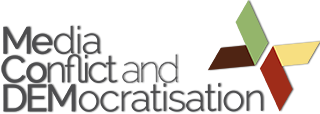Empirical findings from interviews with journalists in Egypt, Kenya, Serbia, and South Africa are now available!
Download at: http://www.mecodem.eu/publications/working-papers
Executive summary:
This report provides an overview of core comparative findings from MeCoDEM interviews with journalists in Egypt, Kenya, Serbia and South Africa. It investigates the role of journalistic actors in transitional societies across a set of comparable democratisation conflicts and themes of inquiry: journalistic work practices, role perceptions, and ethical principles and dilemmas. Empirically, the study builds on qualitative semi-structured face-to face in-depth interviews with 100 professional journalists working for local news organisations in the four countries. Interviews employed the reconstruction method.
- The analysis indicates that to varying degrees, journalistic work practices, role perceptions, and ethical orientations could have both a productive and counterproductive impact on journalistic performance when covering democratisation conflicts. Consequently, the nature of the impact could inform journalism’s role in democratisation processes as likely either constructive or destructive.
- Journalists feel their professional work includes a range of potentially productive roles. These involve not only informing accurately and fairly about democratisation conflicts but also overseeing and questioning political authorities (watchdog role), investigating and explaining the contexts of conflicts (investigator and teacher), capturing voices of the voiceless and fighting for people’s rights (agent for social change), moderating between conflict parties and facilitating public debate, and finally seeking to keep the country together and to transmit messages of tolerance and peace (agent for peace).
- Journalists express commitment towards strong ethical ideals and values, for example, balanced and truthful reporting and consider it their ethical obligation to limit the likelihood of inciting violence. On the other hand, ethical ideals and values are at times overridden by journalists’ personal biases (national, racial, religious, moral etc.), potentially resulting in imbalanced portrayals of conflicts. Pursuit of objectivity was at times deemed destructive to democratisation, especially when reporting of conflicts necessitates inclusion of information which could incite violence.
- Within journalistic work practices, the following are understood to be the overall goals when presenting a conflict story: enhancing conflict-sensitive reporting as far as balancing different sides of a story, challenging ‘inciting’ voices, and responsible choice of words. Yet, the described logic of ‘sensationalising’ and (over)simplifying of news and focussing on violence when selecting and framing a story seem to considerably reduce chances for conflict-sensitive reporting.
- Cross-national comparative findings reflect specific country contexts and structural conditions to be a consistent factor that shapes journalistic work practices, role perceptions and ethical orientations. On the other hand, various cross-national similarities have been detected, including “universal” journalistic routines and logics when describing procedures of selecting topics, investigating and framing stories. However, intervening structural constraints might lead to different outcomes of these practices. Most journalists refer to similar journalistic roles while their concrete understanding and implementation of these might differ considerably. Journalists across all countries identify overarching guiding values of objectivity and truthfulness, but their application depends on the (country and conflict-specific) dilemmas they encounter.
- Finally, journalistic work practices, role perceptions and ethical orientations seem to vary depending on conflict type. The journalists’ individual perception of the conflict and the media outlet’s stance seem to be crucial intervening factors during reporting. Moreover, role perceptions differ depending on the conflict: While journalists highlight watchdog and investigative roles when reporting on ‘predominantly political’ conflicts such as election campaigns and conflicts over the distribution of power, acting as agents for social change and agents for peace seem to dominate when reporting on conflicts over citizenship and minority rights.
